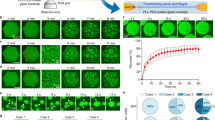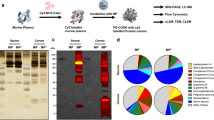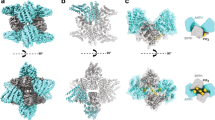Abstract
IN a recent paper in Nature, Bretscher1 proposed that the capping phenomenon2,3 is caused by a continuous, directional flow of the lipid components of the plasma membrane across the cell surface from one end to the other, while the membrane proteins remain dispersed by random thermal motion and therefore do not normally participate. Bretscher's explanation of capping is that the cross linking of membrane proteins by attached antibodies and lectins causes them to be swept along by this lipid current and collected at the “uroid” portion of the cell surface, where he proposes that the membrane lipid is taken into the cytoplasm (by way of a “molecular filter”) for return to the opposite side of the cell as cytoplasmic vesicles. In this way Bretscher can account for the selective accumulation into caps of certain classes of surface antigen, without needing to postulate any communication between the surface and the interior. Cross-linked antigens would simply be swept into caps by the lipid current, while uncross-linked antigens would remain dispersed, just as is actually observed.
This is a preview of subscription content, access via your institution
Access options
Subscribe to this journal
Receive 51 print issues and online access
$199.00 per year
only $3.90 per issue
Buy this article
- Purchase on Springer Link
- Instant access to full article PDF
Prices may be subject to local taxes which are calculated during checkout
Similar content being viewed by others
References
Bretscher, M. S., Nature, 260, 21–23 (1976).
Taylor, R. B., Duffus, W. P. H., Raff, M. C., and de Petris, S., Nature new Biol., 233, 225–229 (1971).
Edidin, M., and Weiss, A., Proc. natn. Acad. Sci. U.S.A., 69, 2456–2459 (1972).
Abercrombie, M., Heaysman, J. E. M., and Pegrum, S. M., Expl Cell Res., 62, 389–398 (1970).
Harris, A. K., Acta Protozool., 9, 145–151 (1972).
Harris, A. K., and Dunn, G. A., Expl Cell Res., 73, 519–523 (1972).
Harris, A. K., in Locomotion of Tissue Cells, Ciba Foundation Symposium 14, 3–20 (Churchill, London, 1973).
Glasstone, S., Textbook of Physical Chemistry, 831 (Macmillan, London, 1956).
Wirtz, K. W. A., and Zilversmit, D. B., J. biol. Chem., 243, 3596–3602 (1968).
McMurray, W. C., and Dawson, R. M. C., Biochem. J., 112, 91–108 (1969).
de Petris, S., and Raff, M., in Locomotion of Tissue Cells, Ciba Foundation Symposium 14, 27–41 (Churchill, London, 1973).
Ryan, G. B., Borysenko, J. Z., and Karnovsky, M. J., J. Cell Biol., 62, 351–365 (1974).
Author information
Authors and Affiliations
Rights and permissions
About this article
Cite this article
HARRIS, A. Recycling of dissolved plasma membrane components as an explanation of the capping phenomenon. Nature 263, 781–783 (1976). https://doi.org/10.1038/263781a0
Received:
Accepted:
Issue Date:
DOI: https://doi.org/10.1038/263781a0
This article is cited by
-
Amoeboid movement: A review and proposal of a ‘membrane ratchet’ model
Experientia (1987)
-
Direct evidence for microfilament-mediated capping of surface receptors on crawling fibroblasts
Nature (1983)
-
Cell-surface labelling reveals no evidence for membrane assembly and disassembly during fibroblast locomotion
Nature (1979)
-
Essential role of surface-bound chemoattractant in leukocyte migration
Nature (1977)
Comments
By submitting a comment you agree to abide by our Terms and Community Guidelines. If you find something abusive or that does not comply with our terms or guidelines please flag it as inappropriate.



